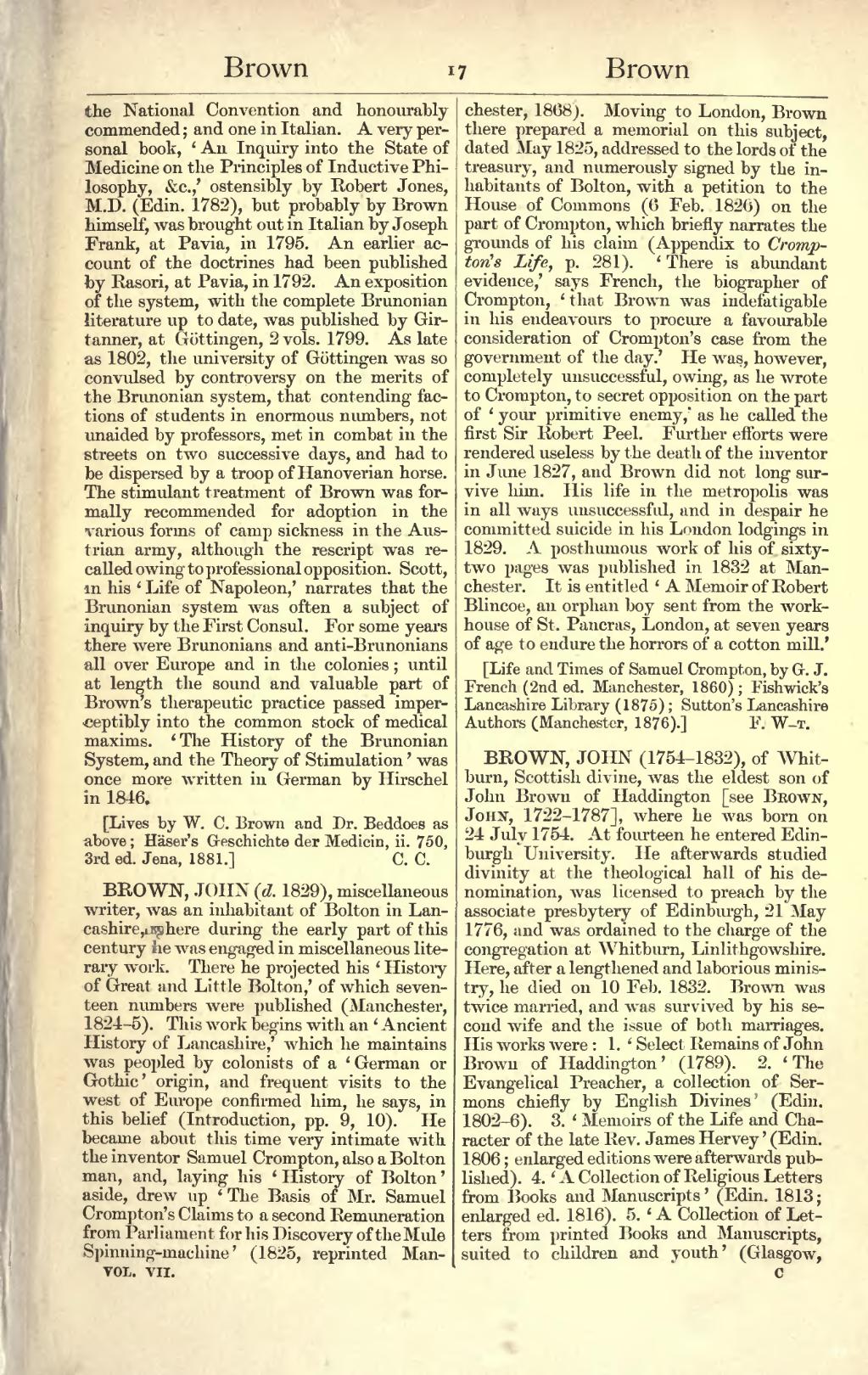the National Convention and honourably commended; and one in Italian. A very personal book, 'An Inquiry into the State of Medicine on the Principles of Inductive Philosophy, &c.,' ostensibly by Robert Jones, M.D. (Edin. 1782), but probably by Brown himself, was brought out in Italian by Joseph Frank, at Pavia, in 1795. An earlier account of the doctrines had been published by Kasori, at Pavia, in 1792. An exposition of the system, with the complete Brunonian literature up to date, was published by Girtanner, at Gottingen, 2 vols. 1799. As late as 1802, the university of Gottingen was so convulsed by controversy on the merits of the Bnmonian system, that contending factions of students in enormous numbers, not unaided by professors, met in combat in the streets on two successive days, and had to be dispersed by a troop of Hanoverian horse. The stimulant treatment of Brown was formally recommended for adoption in the various forms of camp sickness in the Austrian army, although the rescript was recalled owing to professional opposition. Scott, in his 'Life of Napoleon,' narrates that the Brunonian system was often a subject of inquiry by the First Consul. For some years there were Brunonians and anti-Brunonians all over Europe and in the colonies; until at length the sound and valuable part of Brown's therapeutic practice passed imperceptibly into the common stock of medical maxims. 'The History of the Brunonian System, and the Theory of Stimulation ' was once more written in German by Hirschel in 1846.
[Lives by W. C. Brown and Dr. Beddoes as above; Haser's Geschichte der Medicin, ii. 750, 3rd ed. Jena, 1881.]
BROWN, JOHN (d. 1829), miscellaneous writer, was an inhabitant of Bolton in Lancashire, where during the early part, of this century he was engaged in miscellaneous literary work. There he projected his 'History of Great and Little Bolton,' of which seventeen numbers were published (Manchester, 1824–5). This work begins with an 'Ancient History of Lancashire,' which he maintains was peopled by colonists of a 'German or Gothic' origin, and frequent visits to the west of Europe confirmed him, he says, in this belief (Introduction, pp. 9, 10). He became about this time very intimate with the inventor Samuel Crompton, also a Bolton man, and, laying his 'History of Bolton' aside, drew up 'The Basis of Mr. Samuel Crompton's Claims to a second Remuneration from Parliament for his Discovery of the Mule Spinning-machine' (1825, reprinted Manchester, 1868). Moving to London, Brown there prepared a memorial on this subject, dated May 1825, addressed to the lords of the treasury, and numerously signed by the inhabitants of Bolton, with a petition to the House of Commons (6 Feb. 1826) on the part of Crompton, which briefly narrates the grounds of his claim (Appendix to Crompton's Life, p. 281). 'There is abundant evidence,' says French, the biographer of Crompton, 'that Brown was indefatigable in his endeavours to procure a favourable consideration of Crompton's case from the government of the day.' He was, however, completely unsuccessful, owing, as he wrote to Crompton, to secret opposition on the part of 'your primitive enemy,' as he called the first Sir Robert Peel. Further efforts were rendered useless by the death of the inventor in June 1827, and Brown did not long survive him. His life in the metropolis was in all ways unsuccessful, and in despair he committed suicide in his London lodgings in 1829. A posthumous work of his of sixty-two pages was published in 1832 at Manchester. It is entitled 'A Memoir of Robert Blincoe, an orphan boy sent from the workhouse of St. Pancras, London, at seven years of age to endure the horrors of a cotton mill.'
[Life and Times of Samuel Crompton, by G. J. French (2nd ed. Manchester, 1860); Fishwick's Lancishire Library (1875); Sutton's Lancashire Authors (Manchester, 1876).]
BROWN, JOHN (1754–1832), of Whitburn, Scottish divine, was the eldest son of John Brown of Haddington [see Brown, John, 1722–1787], where he was born on 24 July 1754. At fourteen he entered Edinburgh University. He afterwards studied divinity at the theological hall of his denomination, was licensed to preach by the associate presbytery of Edinburgh, 21 May 1776, and was ordained to the charge of the congregation at Whitburn, Linlithgowshire. Here, after a lengthened and laborious ministry, he died on 10 Feb. 1832. Brown was twice married, and was survived by his second wife and the issue of both marriages. His works were:
- 'Select Remains of John Brown of Haddington' (1789).
- 'The Evangelical Preacher, a collection of Sermons chiefly by English Divines' (Edin. 1802–6).
- 'Memoirs of the Life and Character of the late Rev. James Hervey' (Edin. 1806; enlarged editions were afterwards published).
- 'A Collection of Religious Letters from Books and Manuscripts' (Edin. 1813; enlarged ed. 1816).
- 'A Collection of Letters from printed Books and Manuscripts, suited to children and youth' (Glasgow,
